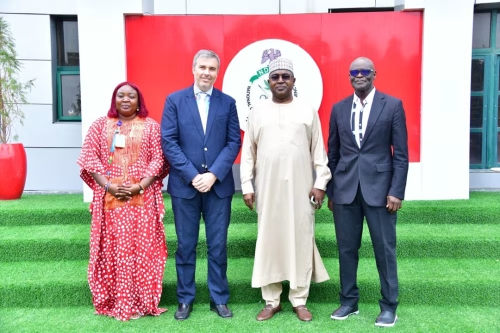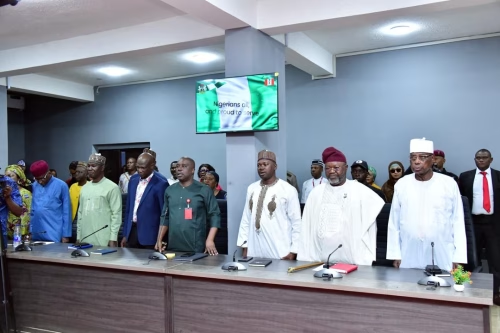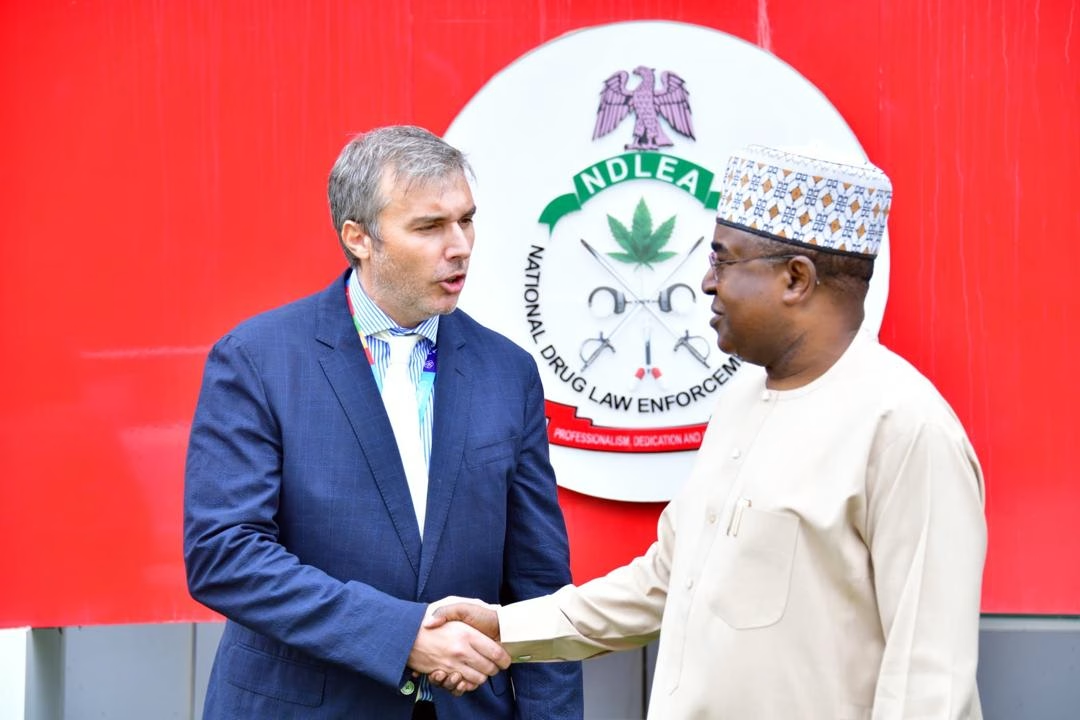By Ebinum Samuel
The Nigerian public has been challenged to get involved and take full ownership of the fight against substance abuse and illicit drug trafficking with a view to curbing the menace and preventing young people from falling into the drug trap.
Chairman/Chief Executive Officer of the National Drug Law Enforcement Agency (NDLEA), Brig Gen Mohamed Buba Marwa (Rtd) gave the challenge at a joint press conference with the United Nations Office on Drugs and Crime (UNODC) at the Agency’s National Headquarters in Abuja on Wednesday 18th June 2025 to announce weeklong activities to commemorate this year’s world drug day.
“As we enter another United Nations year focused on prevention, it is vital to stress that the responsibility of shielding our citizens from harmful substances does not rest solely on the shoulders of the NDLEA. It is a collective duty—one that demands the involvement of all, including the general public. On our part, we shall intensify our War Against Drug Abuse (WADA) social advocacy initiatives to further support families, schools, communities, workplaces, places of worship, associations, and trade unions in raising awareness on the dangers of illicit drug use and how to avoid falling victim”, Marwa stated.
He noted that each year, the World Drug Day is guided by a unique theme that shapes the global response to the challenges of drug abuse and illicit trafficking over the following 12 months, adding that this year’s theme “will once again serve as a framework for our awareness campaigns, stakeholder engagements, and community outreach efforts. The theme for this year is: The Evidence is Clear: Invest in Prevention.”
According to him, “We have lined up a variety of impactful activities beginning with today’s press briefing, culminating in the grand finale on 26th of June. These events are designed to raise public awareness, encourage dialogue, and galvanise collective action towards combating drug abuse and illicit trafficking.
“On Friday, June 20, we will hold a Juma’at service at the National Mosque, Abuja. The following day, Saturday, 21st of June at 8am, we will stage a Walk Against Drug Abuse in collaboration with MTN Nigeria Foundation and the University of Abuja at the University campus in Gwagwalada.
“On Sunday, 22nd of June, a Thanksgiving Service will be held at Mountain of Fire and Miracles Ministries Regional Church, Wuye, Abuja, starting at 10 am. We will begin the following week with the final stage of an Essay Competition on Monday, 23rd of June. In this round, schoolchildren will present letters they have written on the theme: “Why I Must Not Take Drugs.” The event will be held at the NDLEA Conference Room at our headquarters in Jahi. The day will also include a range of NGO-led activities focused on drug prevention and youth engagement.
“Our focus on Tuesday, 24th of June, will be on out-of-school youth. To this end, we will conduct an outreach campaign in markets and motor parks across the FCT Area Councils, beginning at 8 am. Finally, on Thursday, 26th of June, which marks World Drug Day, we will hold the grand finale—a commemorative event at the State House Conference Centre, commencing at 9 am.”
He said as part of efforts to address the country’s drug use situation, the NDLEA has also continued on an upward trajectory in terms of arrests, convictions, and seizures.
“We are also modernising our approach to the enforcement of drug laws by embedding innovation in our operations. Notably, the use of body cameras has now been fully integrated into our field activities. Overall, the past year has witnessed significant positive developments in our offensive against drug traffickers and barons.

“In the four and a half years of my leadership, the Agency has been advancing steadily on the path of reform and progress. Earlier this year, in February, we commissioned our first barracks in Yola, Adamawa State. In April, we commissioned both an accommodation facility and a rehabilitation centre in Kano. At present, the barracks in Abuja stands almost ready for commissioning, while the one in Lagos is nearing completion”, he added.
Also speaking at the briefing, UNODC Country Representative, Cheikh Ousman Toure by the Deputy Head of UNODC in Nigeria, Danilo Campisi, emphasized the importance of preventive measures in addressing the global drug use problem. He said “the illicit drug trade is deeply connected to other crimes including human trafficking, illegal mining and environmental destruction. Its proceeds often finance violent extremist groups further destabilizing affected regions. Together these interconnected crimes are part of a vicious circles that entrench poverty, exploitation, institutional weakness and addiction.”

While commending Marwa and NDLEA for doing an excellent work in Nigeria, the UNODC called on state governments to get actively involved in the efforts being coordinated by the NDLEA at the centre. “Stopping drug trafficking requires long-term coordinated action to address supply and demand and prevent organized criminal groups from exploiting vulnerabilities. Most critically, we must involve the sub-nationals, the state governments must be actively involved in drug control efforts working with NDLEA and other relevant entities to ensure the availability of evidence-based preventions and treatment programmes in their states. We will not make significant progress if interventions continue to be centralized.
“This is why UNODC support to Nigeria remains resolute and multifaceted. We are working side-by-side with the government of Nigeria to build forensic and border management capacity to intercept drug flows and strengthen law enforcement capabilities; enhance regional responses to transnational organized crime through training, intelligence sharing and support for joint investigations.
“We stand in solidarity with the Nigerian government, civil society and communities in the fight to dismantle criminal chains, prevent addiction and restore dignity through recovery. We also commend the leadership of NDLEA and the chairmanship of General Marwa whose strategic and courageous efforts continue to make an impact on both supply and demand sides of this crisis. And UNODC is really proud to be a partner of this vital journey.”






















 Giving his testimony at the Service, Justice Galumje told the fully packed church audience that he wedded his late wife on the 30th of July 1977 and that they promised themselves that only death can separate them. He thanked God that they were able to keep to the covenant and only separated on the 4th of June this year when she was called to higher glory.
Justice Galumje said he tested his wife severally to see if he will incure her anger, but noted that each time she kept quiet, adding that her story to all women is to keep quiet whenever “your husband is angry”. We lived a peaceful life, he noted.
The retired Supreme Court Justice thanked the congregation for their prayers and encouragement .
Justice Galumje said God has been good to him, “from a remote village in Taraba to where I am now, it can only be God.”
He expressed sincere thanks to President Bola Ahmed Tinubu who he said not only called to commiserate with him on the death of his wife but sent his Vice who visited him at his residence.
Rev. Dr. Mark Ato Yohanna of the Christian Reformed Church gave the exhortation at the Service while Rev Daniel Eska-Uten Yohanna, Chairman of the Church prayed for the family.
The first reading at the Service was presented by Bar. Emocha Paul Galumje, son of the deceased while the second scripture reading was taken by Emoseh Paul Galumje, daughter.
According to Ikechukwu Ani, PSC spokesman, the remains of Mrs Zeporah Paul Galumje departs Abuja on Thursday, 19th June, 2025 for Jalingo, Taraba state for a wake keep at No 2 Justice Paul Galumje Street, Jalingo. There will be a Full Gospel Business Men’s Fellowship International on Friday, June 20th. The same day, she will lie in state at her husbands residence in Jalingo and leave for Didan village also in Taraba State on Saturday June 21st for funeral service and Interment.
Other dignitaries who attended the Service of Songs in Abuja yesterday included, Senator Emmanuel Bwacha, Elder Obada Ando, Elder Seth Ika’a, Elder Usman Kaigama; Lawal N. Akirikwen SAN, Lawal Rabana, SAN, D.D Dodo, SAN, Emman Bala and Willy Ashigye.
Others were AIG H. Karma rtd, Justice Josephine Tuturu, Hon. Sam Ada, Mr. and Mrs. Davies Dada, Hon. Danjuma Shidi and Mr. Kifas Danladi among others.
Mrs. Zeporah Paul Galumje born in 1958 died on 4th June 2025.
Giving his testimony at the Service, Justice Galumje told the fully packed church audience that he wedded his late wife on the 30th of July 1977 and that they promised themselves that only death can separate them. He thanked God that they were able to keep to the covenant and only separated on the 4th of June this year when she was called to higher glory.
Justice Galumje said he tested his wife severally to see if he will incure her anger, but noted that each time she kept quiet, adding that her story to all women is to keep quiet whenever “your husband is angry”. We lived a peaceful life, he noted.
The retired Supreme Court Justice thanked the congregation for their prayers and encouragement .
Justice Galumje said God has been good to him, “from a remote village in Taraba to where I am now, it can only be God.”
He expressed sincere thanks to President Bola Ahmed Tinubu who he said not only called to commiserate with him on the death of his wife but sent his Vice who visited him at his residence.
Rev. Dr. Mark Ato Yohanna of the Christian Reformed Church gave the exhortation at the Service while Rev Daniel Eska-Uten Yohanna, Chairman of the Church prayed for the family.
The first reading at the Service was presented by Bar. Emocha Paul Galumje, son of the deceased while the second scripture reading was taken by Emoseh Paul Galumje, daughter.
According to Ikechukwu Ani, PSC spokesman, the remains of Mrs Zeporah Paul Galumje departs Abuja on Thursday, 19th June, 2025 for Jalingo, Taraba state for a wake keep at No 2 Justice Paul Galumje Street, Jalingo. There will be a Full Gospel Business Men’s Fellowship International on Friday, June 20th. The same day, she will lie in state at her husbands residence in Jalingo and leave for Didan village also in Taraba State on Saturday June 21st for funeral service and Interment.
Other dignitaries who attended the Service of Songs in Abuja yesterday included, Senator Emmanuel Bwacha, Elder Obada Ando, Elder Seth Ika’a, Elder Usman Kaigama; Lawal N. Akirikwen SAN, Lawal Rabana, SAN, D.D Dodo, SAN, Emman Bala and Willy Ashigye.
Others were AIG H. Karma rtd, Justice Josephine Tuturu, Hon. Sam Ada, Mr. and Mrs. Davies Dada, Hon. Danjuma Shidi and Mr. Kifas Danladi among others.
Mrs. Zeporah Paul Galumje born in 1958 died on 4th June 2025.